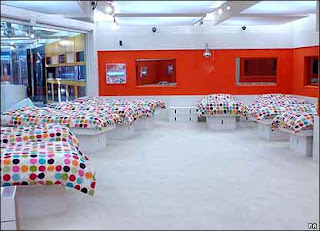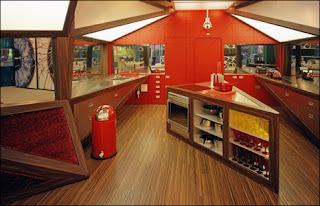CHOOSE SOME ASPECT OF SOCIETY TODAY THAT IS AN EXAMPLE OF PANTOPTISISM - A SHORT BIT OF WRITING - CRITICAL , USE TECHNICAL TERMINOLOGY
A barefaced example of panoptisism in society today is the popular television franchise Big Brother. It is a reality show where a group of individuals spend a certain amount of weeks , sleeping , eating and taking part in tasks together under the same roof, isolated from the outside world but constantly viewed by the public eye.
The brilliant element of the programme is that the people who are put into the house are complete strangers and their relationship is monitored by TV editors 24hours a day by live cameras situated around the house ,which is also broad casted on live television. This in turn makes it so blatant to the housemates that they are being watched. This makes the contestants play up and act differently so that they become liked by the public so that they will then win the show 'or the money!'‘power relations have an immediate hold upon it [the body]; they invest it, mark it, train it, torture it, force it to carry out tasks, to perform ceremonies, to emit signs’ (Foucault 1975)
The fact that the individuals are strangers to each other is so entertaining as they do not always see eye to eye, this is when popularity and statuses evolve of the housemates by the public , who decide which person will be evicted from the house each week.
I find it so interesting how people become so judged and categorised by a nation of people who don't actually know them, big brother can make or break you , a perfect example of this is the status of a former celebrity 'Jade Goodey' who was made into a celebrity , loved by the British public from entering the house in 2003, until 2007 when she re-entered the big brother house which then put her into an unfavourable light on accusations of being racist whilst her time in the house.
Constantly being watched form a self regulation within the housemates , it emotionally and physically changes the them throughout the programme, which is what makes the simple reality of it so popular. This relates to Faucaults view on the INSTITUTIONAL GAZE - the idea of an institution to the prisoners, being watched by 'people' as oppose to 'one person' which in turn makes you act as though the law institution wants you to act, how society has coded you to act. Being constantly watched effects the contestants and persuades them into being someone there not so that they don't get evicted , which then effects their relationships in the house as it create a competitive attitude amongst them. This relates to the section where Faucault talks about the prisoner constantly being watched and how this effects them, Foucault calls this a 'Docile Body;, somebody who wont resist, somebody who will be trained and forced to act a certain way which is what Disciplinary Society produces , in this case , the production team of big brother and the public eye - 'RELATIONSHIP BETWEEN POWER, KNOWLEDGE AND THE BODY'
The layout of the big brother has panoptitism written all over it! The house is surrounded by a barbed wired fence , is under 24hour surveillance and the housemates are forbidden to leave the house unless evicted. Which has all the same elements of a Panopticon which is a circular building , under constant surveillance , surrounded by an outer wall, containing occupants (for example, inmates in a prison). This layout design of both the big brother house and a Panopticon both open plan which makes it very easy to be monitored and extremely hard to escape view of the higher power , in my example the higher power being the public eye and television editors'.
"power is not a thing or a capacity people have –
it is a relation between different individuals and groups, and only exists when it is being exercised"












